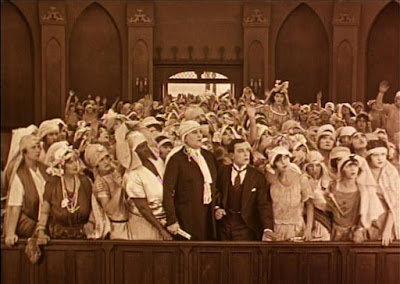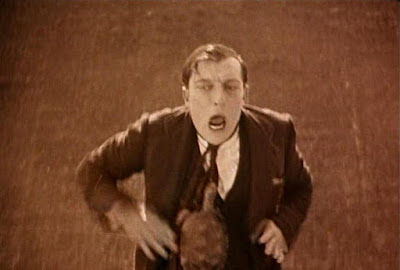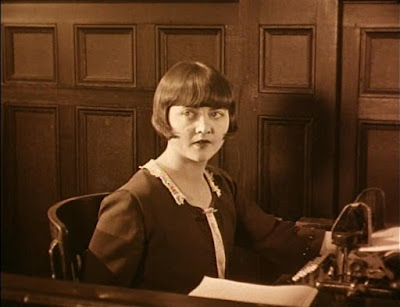 Director: Buster Keaton
Director: Buster KeatonSynopsis: To inherit seven million dollars, Buster Keaton must be married by 7:00pm on his 27th birthday which just so happens to be--gulp--TODAY!
Review: I must confess that I have actually seen The Bachelor starring Chris O'Donnell. I don't have a reason. It wasn't at the behest of a girlfriend. It wasn't the Ludovico technique. I sat down for no apparent reason and watched The Bachelor...probably on TBS.
"...because it was there" — Sir Edmund Hillary
Anyway, I was completely unaware until about a day before watching Seven Chances that The Bachelor was a remake of this movie (Seven Chances is itself an adaptation of a play). I don't remember how closely The Bachelor followed Seven Chances as the only memorable portion was Chris O'Donnell being chased by a mob of women in bridal gowns.
It is unfortunate that the only really memorable thing about Seven Chances is also the chase. The first half of this movie as Buster Keaton struggles to find a bride is acceptable but it's nothing particularly special after seeing some other Keaton work. It never took off as much as it probably could have. It seemed maybe too easy I suppose.
One bit that worked well was a reveal, after Buster makes his approach, that a woman has a child. After confirming the child is hers, Buster inquires whether or not she plans to take care of it. It was the biggest laugh for me until the chase scene.
The chase scene is the main reason to watch this. Buster Keaton gets to a church where his friend has assured him that a bride will be waiting and hundreds of women are ready to marry into seven million dollars. Not being keen on this idea, Buster runs through a series of increasingly dangerous and ridiculous gimmicks as Buster Keaton is known to do.
My personal favorite is this turtle holding onto his necktie:
 Like much of the chase, there's very little reason or context for this. I like to imagine the writing process for movies like this because I wonder how something like this comes about. "Buster should jump in a river for three seconds just so he can come out with a turtle hanging from him."
Like much of the chase, there's very little reason or context for this. I like to imagine the writing process for movies like this because I wonder how something like this comes about. "Buster should jump in a river for three seconds just so he can come out with a turtle hanging from him."So, old movies are pretty racist. (nice transition)
Buster becomes pretty desparate for a wife at a certain point in the film and asks almost every woman he comes across including drag queen Julian Eltinge. Buster doesn't bother asking a Jewish woman or a black woman as soon as he discovers their ethnicity. I guess that was probably funny in 1925. The only prominent black character is in black face as well.
Also of note is Christina Ricci's cameo:
 I liked this movie overall but it never felt like it was as funny as a Buster Keaton film should be (Keaton didn't even want the only surviving copy restored. I enjoyed Neighbors included on the DVD more than Seven Chances.
I liked this movie overall but it never felt like it was as funny as a Buster Keaton film should be (Keaton didn't even want the only surviving copy restored. I enjoyed Neighbors included on the DVD more than Seven Chances.7/10


 This still is him at his worst:
This still is him at his worst: He has gone from smiling which a woman on each arm to a jobless thief who apparently has chosen the path with the least amount of grooming. Even his previously immaculate uniform has started to fall apart.
He has gone from smiling which a woman on each arm to a jobless thief who apparently has chosen the path with the least amount of grooming. Even his previously immaculate uniform has started to fall apart.
 Buster Keaton is wrongfully accused of stealing a watch. He falls asleep and it all comes together nicely in the end...nicely for Buster Keaton not the guy that actually stole the watch.
Buster Keaton is wrongfully accused of stealing a watch. He falls asleep and it all comes together nicely in the end...nicely for Buster Keaton not the guy that actually stole the watch.